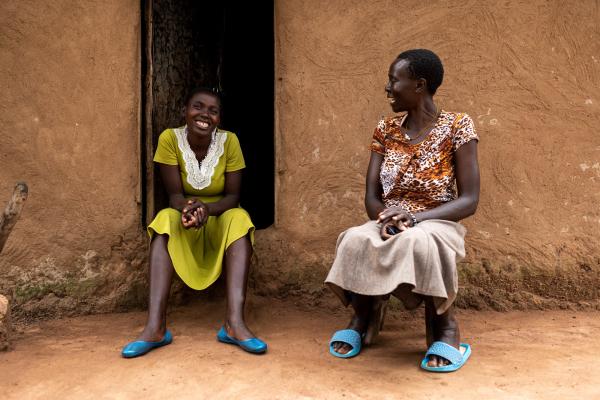My name is Christina Kwangwari, and I am the Lead Adviser on Gender Inclusion at VSO. My main role is to support gender-related work, including capacity building, policy, and advocacy, and working as a team to meet our objectives.

What attracted me to VSO was their focus on education. Education is an area of personal interest to me because it provides people with something that is hard to take away and provides a platform to transcend classes and can cut across inequalities.
One thing that stands out for me as an example of VSO really practising what it preaches is the approach to disability and inclusion; I can walk into the office and interact with persons with visual impairment, hearing challenges physical mobility challenges. This is not common in many organisations.
What can NGOs do for gender equality?
It's important to prioritise equality and not just for the sake of equality itself, but to address the underlying causes of those inequalities. A transformative gender agenda is essential for any organisation.
Most projects are just adapting to issues of gender sensitivity but have a long way to go to become gender transformative. Gender sensitivity is good, but we must also have that transformative element – to transform society, transform and dismantle power and bias, and transform social norms.
While it's necessary to address the differences between men and women as they come up, we also need to look at long-term strategies and address social norms that take time to change. You find these norms at the root of harmful social practices such as child marriage, which need to be targeted for change to achieve equality.
It's crucial for governments to commit to providing the services needed to achieve equality. Marginalised groups especially women, and LGBTQ+ individuals must also be able to demand their rights and budgets to support those rights. Social norms must be addressed alongside policy and laws.
It's important to recognise the contributions of different genders to the economy. Women have historically contributed a great deal of unpaid care work, such as caring for children and elderly relatives.
I think it's important to recognise these contributions that are not necessarily monetary, which is why they so often go undervalued, invisible and unrecognised, but they are crucial to our economy and society.
Putting gender on the agenda

I believe that VSO has a strong capacity in many countries, with a pool of knowledgeable and able volunteers who can support interventions. To strengthen our positioning, it's important for all staff and volunteers to have a basic understanding of these issues and to build collaborations and partnerships with women's rights and feminist movements.
While VSO has its own strengths, it's also important to connect with coalitions and networks of marginalised groups, such as women's rights organisations and LGBTQ+ associations, through joint advocacy, partnerships, or collaborations.
By collaborating on movements like International Women's Day, for example, VSO could join with other gender and feminists’ organisations, making sure that it's not just VSO putting up a statement, but maybe ten other organisations that are working on the issue, who are committed and have the same level of passion thereby amplifying the voice
In addition, it is important for gender advocacy groups to ensure that gender issues are looked at beyond just the numbers, and that they go deeper into the transformative element. For instance, Most projects are just adapting to issues of gender sensitivity but have a long way to go to become gender transformative.
Gender sensitivity is good, but we must also have that transformative element – to transform society, transform and dismantle power and bias, and transform social norms.
My most recent speaking engagement
To celebrate International Girls in ICT Day, VSO hosted its very first livestream on Facebook which I chaired alongside my colleague, Joyce Laker, our Global Practice Area Lead for Education.
In the livestream, we welcomed panellists from across the world. They all spoke so passionately about how technology is improving education for children and teachers alike and I am so inspired by this conversation.
If you want to find out how VSO volunteers are harnessing innovative technology to reach the most marginalised and support their livelihoods, please do check out the video below!
Life at VSO
Read our Life at VSO series for more personal accounts of what it's like to work at VSO.
Read more

Transforming lives through education: Geoffrey’s VSO legacy
With a deep belief in the transformative power of education, Geoffrey from Norfolk, UK, has devoted his life both in the UK and abroad to making education more accessible for all.

A ripple of change: how VSO volunteers are transforming communities
Every act of volunteering begins with a choice — a decision to act out of a desire to make a difference. Across the world, VSO volunteers are proving that one spark of action can ignite something much bigger.
